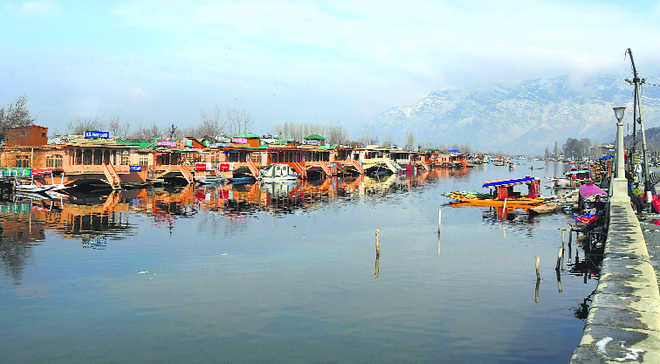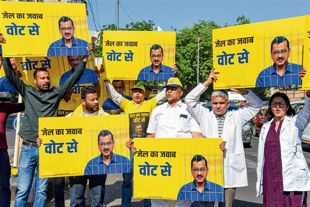
Tribune Photo: Amin War
Gitanjali Sharma
Saifuddin Soz. Even before the controversy kicked in, the name made me pick up the book with some anticipation. A former JK Congress chief and union minister, a senior politician from the Valley and, more importantly, a Kashmiri who would probably know better than many the pulse and problems of the region.
A few pages into the book, and you realise the title is not off the mark. The first half of the volume offers just glimpses, and some such fleeting ones that it becomes difficult to piece together and penetrate Kashmir’s ancient past.
One of the initial chapters begins with the sentence “considerable research notwithstanding, Kashmir’s history is still shrouded in mystery”. By the end of two dozen chapters, each spread over a couple of pages with writings that read more like a string of quotes, the bleary and fuzzy picture of the Kashmir that was gets no clearer. Apparently, in an effort to cover too much ground through the words of several travellers and historians, the reader gets lost in a maze of disjointed takes delving into the Valley’s bygone days. For instance, the two-page chapter on, How far did Fa-Hian travel, contributes little to the understanding of the Valley as it winds up with the conclusion that the Chinese traveller “did not make it to Kashmir”.
Well-known historians Kalhana, PNK Bamzai and travellers like Hiuen Tsiang, Marco Polo, Al-Beruni, Francois Bernier and George Forster are some of the many names whose assessments, travel accounts and descriptions Soz has dipped into in a bid to unravel Kashmir and trace its recorded history which dates back to 3000 BC.
The interest begins to pick up somewhere mid-way through the book as longer takes are devoted to the tyrannical Afghan rule in Kashmir from 1752 to 1819, followed by the Sikh rule spanning 27 years till 1846. The chapter on the Delhi Agreement of 1952, too, makes for an informative read with the highlights of the statement on the pact like “the accession was complete” and “Article 370 was of a transitional nature”.
The chapter, Armed militancy and its aftermath, alludes to the rigging in the J&K Assembly polls of 1987 as the most “plausible argument” accepted for huge unrest among the youth. The abduction of his daughter Naheed by militants in 1991 and her subsequent release after nine days also find mention as Soz sets off to wind up the chapter with examples of a refrain common to most Kashmiris: how AFSPA is misused by the forces.
Admittedly, controversies do manage to draw attention and curiosity. My flagging interest in the brief historical takes instantly made way for a keen study of the volume as Soz invited political wrath for agreeing to Gen Pervez Musharraf’s assessment that “if Kashmiris were given a chance to express their free will, they would prefer to be independent”. The so-called controversial remark, incidentally, arrives just three pages away from the end.
Soz’s response that “this assessment of Musharraf seems to be correct even today!” may not be politically correct for some, but it blends well with the Kashmiri leader’s realistic take on the ground situation. He is candid about his take on the UN too. “In my opinion, it is futile to look to the UN for any workable help for the resolution of the dispute”, he says while advocating a dialogue on two axes: New Delhi-Srinagar/Jammu and New Delhi-Islamabad.
The book on Kashmir by a Kashmiri and for the reform of Kashmir is likely to have some advantages as well as drawbacks. The book extensively mentions the miseries, atrocities and betrayals heaped on the Kashmiris time and again since Independence and earlier, but it does’t escape the reader that the chapter on exodus of Pandits mentions the number of Kashmiri Pandits who stayed behind but forgets to bring up the number that left the Valley, and how. Again, largely the blame for the exodus is pinned on the then Governor Jagmohan Malhotra.
The bit about Sardar Patel’s opposition to Kashmir’s accession to India, which figures in Kuldip Nayar’s book, Beyond the Lines —An Autobiography, makes for an absorbing read. Soz mentions that “Patel remained consistent on his perception that while Pakistan shouldn’t talk of Hyderabad, Kashmir should go to Pakistan.” Quoting Sirdar Shaukat Hayat Khan from his book, The Nation that Lost its Soul, the Congress veteran goes on to divulge how Pakistan Prime Minister Liaquat Ali Khan senselessly turned down Patel’s offer that was brought to him by Lord Mountbatten.
The concluding chapter, The way forward, offers a number of solutions to reach a settlement on the decades-old dispute. The suggestions lay focus on the “Centre showing compassion to people of Kashmir”, “internal dialogue with people of three regions” and “reducing the presence of Army” in the strife-torn state. Many of these recommendations have been been spelled out many times over, some of them probably even carry a pro-Kashmir bias, but as they all emerge from a considered evaluation of the existing scenario, it makes them worth deliberating upon. But on the whole, no new solution comes on the platter… just the angst of a Kashmiri Muslim lingers.



























